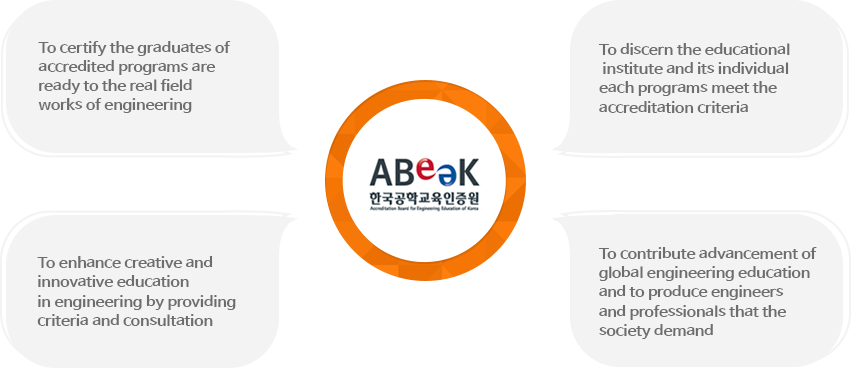mobile menu open

-
About the College
About the College
-
Departments
Departments
-
Key Business & Appendages
Key Business & Appendages
-
Student Support
Student Support
- News
Key Business & Appendages
INTRODUCTION
- Home
- Key Business & Appendages
- Appendages
- Innovation Center for Engineering Education
The purposes of ABEEK
In efforts to guarantee the quality of educational programs in engineering and related disciplines, and thus contribute to advance of engineering education by producing superior engineers, ABEEK offers educational program criteria and guidelines, followed by consultation and accreditation.

Engineering Education Accreditation Organization
Accreditation Board for Engineering Education of Korea : ABEEK
- Since its founding in 1999, the Accreditation Board for Engineering Education of Korea (ABEEK) has strived to assure the quality of educational programs in engineering and related disciplines, and to enhance the professional competence of the graduates of those programs in Korea.
Accreditation Board for Engineering and Technology : ABET
- Vision
ABET is recognized as the worldwide leader in assuring quality and stimulating innovation in applied science, computing, engineering, and engineering technology education.
- Mission
ABET serves the public globally through the promotion and advancement of education in applied science, computing, engineering, and engineering technology.
- Accredits educational programs.
- Promotes quality and innovation in education.
- Consults and assists in the development and advancement of education worldwide.
- Communicates and collaborates with its constituents and the public.
- Anticipates and prepares for the changing educational environment and the future needs of its constituents.
- Manages its operations and resources in an effective and fiscally responsible manner.
Washington Accord
- The Washington Accord is an international accreditation agreement for professional engineering academic degrees, between the bodies responsible for accreditation in its signatory countries. Established in 1989, the signatories as of 2014 are Australia, Canada, Taiwan, Hong Kong, India, Ireland, Japan, Korea, Malaysia, New Zealand, Russia, Singapore, South Africa, Sri Lanka, Turkey, the United Kingdom and the United States.
- The agreement recognizes that there is substantial equivalence of programs accredited by those signatories. Graduates of accredited programs in any of the signatory countries are recognized by the other signatory countries as having met the academic requirements for entry to the practice of engineering. Recognition of accredited programs is not retroactive but takes effect only from the date of admission of the country to signatory status.
Signatory Members (as of June, 2014)
| Country | Member | Joined Year |
|---|---|---|
| United States | ABET, Inc. | 1989 |
| Korea | Accreditation Board for Engineering Education of Korea | 2007 |
| Russia | Association for Engineering Education of Russia | 2012 |
| Malaysia | Board of Engineers Malaysia | 2009 |
| South Africa | Engineering Council of South Africa | 1999 |
| United Kingdom | Engineering Council UK | 1989 |
| Australia | Engineers Australia | 1989 |
| Canada | Engineers Canada | 1989 |
| Ireland | Engineers Ireland | 1989 |
| Taiwan | Institute of Engineering Education Taiwan | 2007 |
| Singapore | Institution of Engineers Singapore | 2006 |
| Sri Lanka | Institution of Engineers Sri Lanka | 2014 |
| New Zealand | Institution of Professional Engineers New Zealand | 1989 |
| Japan | Japan Accreditation Board for Engineering Education | 2005 |
| Turkey | MUDEK | 2011 |
| India | National Board of Accreditation of All India Council for Technical Education | 2014 |
| Hong Kong | The Hong Kong Institution of Engineers | 1995 |

Associate Members (as of June, 2014)
| Country | Member |
|---|---|
| Bangladesh | Board of Accreditation for Engineering and Technical Education |
| China | China Association For Science & Technology |
| German | German Accreditation Agency for Study Programs in Engineering and Informatics |
| Peru | Instituto de Calidad Y Acreditacion de Programas de Computacion, Ingeneria Y Technologia |
| Pakistan | Pakistan Engineering Council |
| Philippines | Philippine Technological Council |
